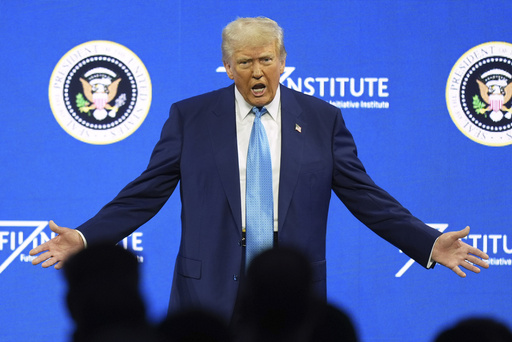MIAMI — Former President Donald Trump issued a stern warning to Ukrainian President Volodymyr Zelenskyy on Wednesday, urging him to act quickly in seeking a resolution to Russia’s ongoing invasion of Ukraine, or he might find his nation in peril.
Trump’s comments arrive during rising tensions between the two leaders, as well as increasing discord between the United States and parts of Europe regarding Trump’s strategy in dealing with this European conflict, notably one of the largest since World War II.
The former president faced backlash from both Democrats and some Republicans due to his remarks about Zelenskyy, which were seen as straying from the traditional bipartisan support for Ukraine’s resistance against Russian aggression. In response, Zelenskyy accused Trump of falling prey to Russian disinformation tactics and received criticism from Vice President JD Vance for publicly rebuking the former president.
Utilizing a lengthy post on his Truth Social platform, Trump criticized Zelenskyy’s leadership, labeling him a “dictator without elections,” and questioned Ukraine’s strategy. “Consider this: a moderately successful comedian, Volodymyr Zelenskyy, persuaded the United States to spend $350 billion on a war that was unwinnable and unnecessary,” Trump stated, reflecting on Zelenskyy’s rise from television star to political leader.
Since the Russian invasion began in February 2022, the U.S. has committed around $183 billion to aid Ukraine, according to findings from the special inspector general overseeing American assistance.
Trump’s claim about Zelenskyy inspired further discourse regarding the war’s impact on upcoming elections in Ukraine, as the ongoing conflict has postponed elections originally scheduled for April 2024.
During a business meeting in Miami hosted by a Saudi Arabian investment group, Trump reiterated that Zelenskyy had performed poorly in his role and accused him of mismanaging U.S. assistance. Trump expressed frustration over Zelenskyy’s assertion that he operates in a “disinformation space” created by Russia.
Vance remarked that Zelenskyy’s public criticism of Trump undermined his position, suggesting that attacking a former president through media channels would not effectively influence current policy.
Despite varying opinions, Ukrainian officials remain critical of Trump’s position. Advisor Mykhailo Podolyak questioned the rationale behind conceding influence to an aggressor like Russia and expressed confusion regarding the strategy being proposed by Trump.
While recent meetings between U.S. and Russian officials in Saudi Arabia sought to explore peace negotiations, Ukrainian and European representatives were noticeably absent. Trump continued to press Zelenskyy to finalize a deal swiftly, implying that failure to do so could jeopardize Ukraine’s sovereignty.
“In the meantime, negotiations to end the war with Russia are progressing, and many think only ‘Trump’ can achieve a resolution. Biden has not made an effort, and Europe has largely fallen short,” he declared.
Trump’s claims turned contentious as he suggested that Ukraine, rather than Russia, had provoked the conflict in a startling revision of events that led to the invasion. This comment drew sharp rebukes from Senate leaders, with Democratic leader Chuck Schumer condemning Trump for siding with Russian President Vladimir Putin against an ally.
Senator John Kennedy, a Republican, also rejected Trump’s assertion, affirming that the root of the conflict lay with Putin’s aggression, dubbing the Russian leader a “gangster.” Also, Senator Dick Durbin expressed that Trump’s remarks were disrespectful to the victims of the war and echoed the sentiment that Trump was too deferential to Putin.
Senate Majority Leader John Thune indicated a need for the Trump administration to create space for a resolution while maintaining support for Ukraine amidst Trump’s escalating rhetoric towards Zelenskyy. Thune’s priority remains on achieving a peaceful resolution.
Frustration directed at Zelenskyy also stemmed from his recent instruction to his government not to finalize a planned agreement granting the U.S. access to Ukraine’s rare earth minerals, citing that the arrangement seemed to favor U.S. interests disproportionately.
Trump expressed indignation during his speech regarding what he perceived as missed opportunities in negotiations, claiming that a U.S. delegation felt disrespected during their visit to Kyiv.
On the ground in Ukraine, retired Lt. Gen. Keith Kellogg, who served as Trump’s special envoy, met with Ukrainian officials, emphasizing the tragic human toll of the war and underscoring a collective desire for a resolution.
The next steps in the conflict remain uncertain, especially with contrasting perspectives brewing in both American and Ukrainian leadership over strategies for peace.




